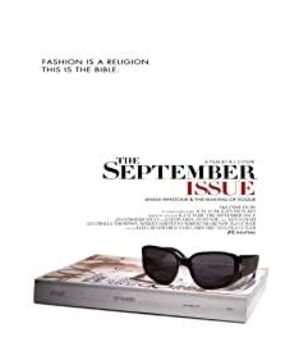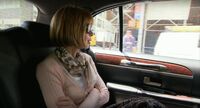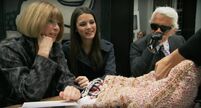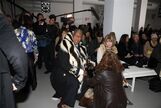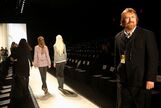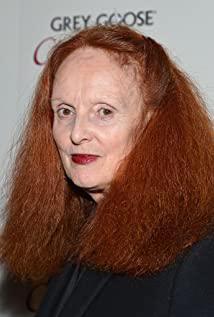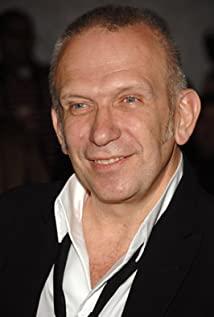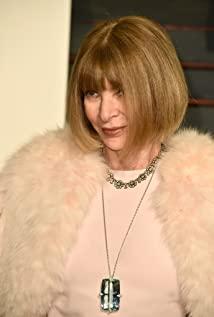Cutler Interview - 2009, Paris Director: I know very little about her, which is my advantage because I don't know her at all, and I'm unfamiliar with the fashion world, which allows me to Intrigued and attracted to become the director of this film. I can ask questions like, "Who is Anna Winter? How does she work? What does she do? Who does she work with?" For me, it's all about discovery. You just said I'm not a fashion reporter, I'm not a reporter at all, I'm a director, I tell people's stories. I care about people who excel in their fields, who love what they do, and who will do their best to do it well. Paying a lot is also worth it. That's my motivation. Someone asked me, "When did you want to make this movie?" I finished watching "The Met" I started having this idea after the article in "Ball". But it wasn't until I met Anna that I said to myself, "I want to make this movie." That article intrigued me and drove me to call them and ask them to help me arrange a meeting. Then they invited me to New York to meet them, but I didn't meet Anna... I was in her office at the time, it was just me and her. I captured the way she communicated and saw a more human side of her, and I thought, "This could be made into a movie." We started working right away, and we started talking about my ideas right away. The idea is: to observe. There is no pre-determined framework, assumption, I just follow my own curiosity. I said to her, "I want to see your work. The point is to see your work and who you work with." She replied, "In that case, you'll have to track the design of our September issue." Her reasoning was, All of their remaining work is related to the design of the September issue, which will take them a year. That means I could spend a year with them. I said to her, "If I'm going to make this film, I need to know who is in charge of the film. I have to make the final cut, otherwise what's the point of the film?" She said: "I get it. My dad is a journalist and I'm a journalist, that's not a problem." I thought it was fantastic. We discussed the method of shooting, the structure of the film, and who else did the final editing. What a productive meeting it was! Another thing I find interesting is that a character like Anna Winter, this mysterious person, told me about her father in our first meeting, which set me up for this movie. general direction. This meeting was very rewarding. So when I left, I thought to myself that the work had already started. We had a contract with Condé Nast, but the contract was not financially binding, neither of us had to pay, and the copyright to the images did not belong to them. This contract states that if I damage something I am responsible. If my equipment damages the wall, we're going to fix the wall. The contract also limited their trademark use rights. "Vogue" is a trademark, it has a specific typography style, I can use it in the movie, but not my own company. In addition to this, it is clearly stated that I have the final splicing rights. --About Grace? She was tough at one point, and because of this, others felt unacceptable at first, until she entered the camera, and all of them recorded her passionately. During filming, people said to me, "It's incredible how you can cast Grace as your actor! Even Anna can do it. Certainly! "No one could believe it, but we did it. -- How did you do it? Because I am very attractive. I told her we needed her. As a director, I try to find a way of shooting that is satisfying to everyone, otherwise I wouldn't want to make this film. After working with Anna and Grace at Vogue for a while and seeing how they work, I knew what kind of movie I should make. Grace also understands. After thinking about it, I realized that Grace had spent her entire life with photographers and storytellers. Then I came to know that I didn't need to convince her to do what she didn't want to do, but to make her realize that she wanted to do it herself. This gives me confidence. When I went to see her, I assured her that she would enjoy the process, and I only asked her to give me an hour: "You give me an hour and you'll know soon. If you don't like it, we can stop right away." --Anna's story She is the focal point. Everything is influenced by her, I've heard that. But when you see her, like in the movie, the general manager of Neiman Marcus, Burton Tansky, asks her to help deliver the finished designs. There's one other thing that surprises me about what Anna Winter is known for: she's very controlling and decision-making. But people rarely know her another important skill, that is, the ability to attract talent. Those who do things for her are not some people who only obey orders. They're really capable, and I mean character, and talent. For example: Sa Li Xingge, drag Na Goodman, Grace, Coddington, Andrews, Tai Li. Hamis Bowers, Mark or Elgate. . . . . And all the staff up and down. . . . . All are very talented people. Of course they all had to listen to her. But they are really talented. People are people, everyone has parents, everyone has their own birth. In this film, there are often some touching scenes, such as: the "war room" you mentioned just now, where James Cavill made a very touching speech, he talked about his origin, he said that he Thirty years old, he has never been to Washington or New York because he is from a small town in Louisiana. Even if we were born in humble beginnings, we are also born, and this story is very interesting to tell. One of the characteristics of human beings is the desire to tell their own stories. If people didn't have stories, we wouldn't be making movies because we couldn't make them. If people don't want to tell their stories, we don't shoot them. A lot of people ask me, "Why did she say yes?" That has nothing to do with me, it's her own business. She said yes, I won't ask why . We will not ask this question. Just like when you invite someone to dinner and someone agrees, do you still have to ask, "Why did you agree?" This is someone else's business. I didn't stop there and say, "Oh my God!" Although this was the reaction that Anna would evoke wherever she went. As I just said, I have an advantage: because I don't understand fashion, I can look at her more objectively. When I was filming, what I saw was not the big shot Stefano Perratti working on the creation, but a person who was working hard and had talent and ability in her field. He was preparing for an important catwalk tomorrow, and then a woman of great importance came to see him. He knew she was influential and her opinion was important to him. This is what I see. This allows me to present him more realistically. I didn't try to make her look better or worse, and to her, everything was obvious. that is the truth. What the audience sees is not a prestigious designer, but a serious working designer. Seeing him doing a great job, seeing him responsible, and seeing his toughness, that's all. The film is not about their status or fame, but about their work. This is a movie about work. All my films are testimony to the times. Even though they only describe things today, they are still witnesses to an era. I very much hope that the characters in the story can be free from the stigma of the times. This is a story about Anna and Grace. Whether you watch it in 2009 or 2029, this story will always belong to Anna and Grace. Of course, at different times, you will have different views. But all movies are inseparable from this. **************************************************** After watching the interview with the director, the biggest inspiration to me is: no matter what you want to ask others to do, you must pay attention to the way, so that the other party thinks that he wants to do it himself, not what you ask him to do. We are too used to demanding others, especially with children. Thinking that they are their parents and elders has the right to dictate their lives. Getting someone else to do what he doesn't want to do is like riding on him and telling him what's right and what's wrong. I didn't stop there and say, "Oh my God!" Although this was the reaction that Anna would evoke wherever she went. As I just said, I have an advantage: because I don't understand fashion, I can look at her more objectively. When I was filming, what I saw was not the big shot Stefano Perratti working on the creation, but a person who was working hard and had talent and ability in her field. He was preparing for an important catwalk tomorrow, and then a woman of great importance came to see him. He knew she was influential and her opinion was important to him. This is what I see. This allows me to present him more realistically. I didn't try to make her look better or worse, and to her, everything was obvious. that is the truth. What the audience sees is not a prestigious designer, but a serious working designer. Seeing him doing a great job, seeing him responsible, and seeing his toughness, that's all. The film is not about their status or fame, but about their work. This is a movie about work. All my films are testimony to the times. Even though they only describe things today, they are still witnesses to an era. I very much hope that the characters in the story can be free from the stigma of the times. This is a story about Anna and Grace. Whether you watch it in 2009 or 2029, this story will always belong to Anna and Grace. Of course, at different times, you will have different views. But all movies are inseparable from this. **************************************************** After watching the interview with the director, the biggest inspiration to me is: no matter what you want to ask others to do, you must pay attention to the way, so that the other party thinks that he wants to do it himself, not what you ask him to do. We are too used to demanding others, especially with children. Thinking that they are their parents and elders has the right to dictate their lives. Getting someone else to do what he doesn't want to do is like riding on him and telling him what's right and what's wrong. I didn't stop there and say, "Oh my God!" Although this was the reaction that Anna would evoke wherever she went. As I just said, I have an advantage: because I don't understand fashion, I can look at her more objectively. When I was filming, what I saw was not the big shot Stefano Perratti working on the creation, but a person who was working hard and had talent and ability in her field. He was preparing for an important catwalk tomorrow, and then a woman of great importance came to see him. He knew she was influential and her opinion was important to him. This is what I see. This allows me to present him more realistically. I didn't try to make her look better or worse, and to her, everything was obvious. that is the truth. What the audience sees is not a prestigious designer, but a serious working designer. Seeing him doing a great job, seeing him responsible, and seeing his toughness, that's all. The film is not about their status or fame, but about their work. This is a movie about work. All my films are testimony to the times. Even though they only describe things today, they are still witnesses to an era. I very much hope that the characters in the story can be free from the stigma of the times. This is a story about Anna and Grace. Whether you watch it in 2009 or 2029, this story will always belong to Anna and Grace. Of course, at different times, you will have different views. But all movies are inseparable from this. **************************************************** After watching the interview with the director, the biggest inspiration to me is: no matter what you want to ask others to do, you must pay attention to the way, so that the other party thinks that he wants to do it himself, not what you ask him to do. We are too used to demanding others, especially with children. Thinking that they are their parents and elders has the right to dictate their lives. Getting someone else to do what he doesn't want to do is like riding on him and telling him what's right and what's wrong. After watching the interview with the director, the biggest inspiration to me is: no matter what you want to ask others to do, you must pay attention to the way, so that the other party thinks that he wants to do it himself, not what you ask him to do. We are too used to demanding others, especially with children. Thinking that they are their parents and elders has the right to dictate their lives. Getting someone else to do what he doesn't want to do is like riding on him and telling him what's right and what's wrong. After watching the interview with the director, the biggest inspiration to me is: no matter what you want to ask others to do, you must pay attention to the way, so that the other party thinks that he wants to do it himself, not what you ask him to do. We are too used to demanding others, especially with children. Thinking that they are their parents and elders has the right to dictate their lives. Getting someone else to do what he doesn't want to do is like riding on him and telling him what's right and what's wrong. After watching the interview with the director, the biggest inspiration to me is: no matter what you want to ask others to do, you must pay attention to the way, so that the other party thinks that he wants to do it himself, not what you ask him to do. We are too used to demanding others, especially with children. Thinking that they are their parents and elders has the right to dictate their lives. Getting someone else to do what he doesn't want to do is like riding on him and telling him what's right and what's wrong. After watching the interview with the director, the biggest inspiration to me is: no matter what you want to ask others to do, you must pay attention to the way, so that the other party thinks that he wants to do it himself, not what you ask him to do. We are too used to demanding others, especially with children. Thinking that they are their parents and elders has the right to dictate their lives. Getting someone else to do what he doesn't want to do is like riding on him and telling him what's right and what's wrong. After watching the interview with the director, the biggest inspiration to me is: no matter what you want to ask others to do, you must pay attention to the way, so that the other party thinks that he wants to do it himself, not what you ask him to do. We are too used to demanding others, especially with children. Thinking that they are their parents and elders has the right to dictate their lives. Getting someone else to do what he doesn't want to do is like riding on him and telling him what's right and what's wrong. After watching the interview with the director, the biggest inspiration to me is: no matter what you want to ask others to do, you must pay attention to the way, so that the other party thinks that he wants to do it himself, not what you ask him to do. We are too used to demanding others, especially with children. Thinking that they are their parents and elders has the right to dictate their lives. Getting someone else to do what he doesn't want to do is like riding on him and telling him what's right and what's wrong.
View more about The September Issue reviews


